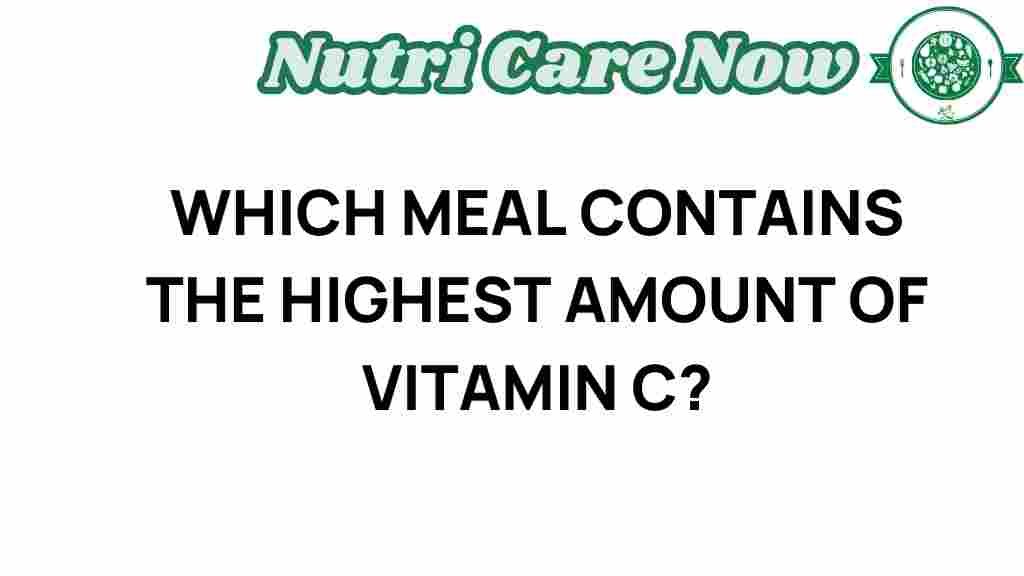Uncovering the Meal with the Most Vitamin C: What You Need to Know
Vitamin C is a vital nutrient that plays a significant role in our overall health. It is renowned for its antioxidant properties and its crucial role in supporting the immune system. In this article, we will explore the dietary sources of Vitamin C, the meals that provide the most of this essential nutrient, and how you can incorporate them into your diet for optimal nutrition and health.
Understanding Vitamin C
Vitamin C, also known as ascorbic acid, is a water-soluble vitamin that is essential for various bodily functions. It aids in:
- Collagen production: Essential for skin health and wound healing.
- Antioxidant protection: Helps neutralize free radicals that can damage cells.
- Immune support: Enhances the function of immune cells and increases the absorption of iron from plant-based foods.
As a powerful antioxidant, Vitamin C helps to protect the body from oxidative stress, which is associated with chronic diseases. Ensuring adequate intake of Vitamin C through meals is essential for maintaining good health.
Top Dietary Sources of Vitamin C
When it comes to Vitamin C, fruits and vegetables are your best friends. Here are some of the richest sources:
- Fruits:
- Guava
- Kiwi
- Strawberries
- Oranges
- Pineapple
- Mango
- Vegetables:
- Bell peppers (especially red and yellow)
- Broccoli
- Brussels sprouts
- Kale
- Spinach
- Cauliflower
Including a variety of these fruits and vegetables in your meals ensures you receive an ample supply of Vitamin C and other essential nutrients.
Meal Ideas Rich in Vitamin C
Now that we know the best dietary sources of Vitamin C, let’s uncover some meals that are packed with this essential nutrient. Here are a few meal ideas that you can easily prepare:
Breakfast: Tropical Smoothie Bowl
Start your day with a vibrant smoothie bowl that combines:
- 1 cup of frozen mango
- 1 banana
- 1 cup of spinach
- 1/2 cup of orange juice
- Top with kiwi slices and a handful of strawberries.
Lunch: Quinoa Salad with Bell Peppers
For a nutritious lunch, prepare a quinoa salad that includes:
- 1 cup of cooked quinoa
- 1 diced red bell pepper
- 1/2 cup of chopped cucumber
- 1/4 cup of chopped parsley
- Juice of 1 lemon
Dinner: Stir-fried Broccoli and Brussels Sprouts
Finish your day with a colorful stir-fry featuring:
- 1 cup of broccoli florets
- 1 cup of halved Brussels sprouts
- 1 tablespoon of olive oil
- 1 minced garlic clove
Serve this with grilled chicken or tofu for a complete meal.
Step-by-Step Process to Maximize Vitamin C Intake
To ensure you are getting the most Vitamin C from your meals, follow these steps:
- Choose Fresh Produce: Opt for fresh fruits and vegetables as they contain higher levels of Vitamin C compared to canned or frozen options.
- Store Properly: Vitamin C is sensitive to heat, light, and air. Store produce in a cool, dark place and consume them soon after purchase.
- Eat Raw or Lightly Cooked: Whenever possible, eat fruits and vegetables raw or lightly steamed to preserve their Vitamin C content.
- Combine Sources: Create meals that combine multiple Vitamin C-rich foods for a delicious and nutritious boost.
Troubleshooting Tips
Sometimes, it can be challenging to incorporate enough Vitamin C into your diet. Here are some troubleshooting tips:
- Incorporate Snacks: Keep Vitamin C-rich snacks on hand, such as citrus fruits, bell pepper strips, or a handful of strawberries.
- Use Vitamin C Supplements: If you struggle to meet your daily needs, consider taking a Vitamin C supplement, but consult with a healthcare professional first.
- Plan Your Meals: Meal planning can help you ensure you include a variety of Vitamin C-rich foods throughout the week.
Conclusion
Incorporating meals rich in Vitamin C is essential for maintaining good health and supporting your immune system. By focusing on a variety of fruits and vegetables in your diet, you can easily meet your nutritional needs. Remember to enjoy these foods fresh and raw whenever possible to maximize their Vitamin C content.
For more information on nutrition and healthy eating, consider visiting Nutrition.gov, a reliable resource for dietary guidance.
By understanding the importance of Vitamin C and its dietary sources, you can take proactive steps to enhance your nutrition and overall well-being.
This article is in the category Health and created by NutriCareNow Team
